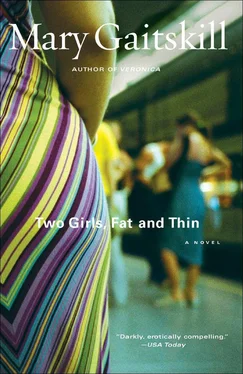Mary Gaitskill - Two Girls, Fat and Thin
Здесь есть возможность читать онлайн «Mary Gaitskill - Two Girls, Fat and Thin» весь текст электронной книги совершенно бесплатно (целиком полную версию без сокращений). В некоторых случаях можно слушать аудио, скачать через торрент в формате fb2 и присутствует краткое содержание. Год выпуска: 2012, Издательство: Simon & Schuster, Жанр: Современная проза, на английском языке. Описание произведения, (предисловие) а так же отзывы посетителей доступны на портале библиотеки ЛибКат.
- Название:Two Girls, Fat and Thin
- Автор:
- Издательство:Simon & Schuster
- Жанр:
- Год:2012
- ISBN:нет данных
- Рейтинг книги:5 / 5. Голосов: 1
-
Избранное:Добавить в избранное
- Отзывы:
-
Ваша оценка:
- 100
- 1
- 2
- 3
- 4
- 5
Two Girls, Fat and Thin: краткое содержание, описание и аннотация
Предлагаем к чтению аннотацию, описание, краткое содержание или предисловие (зависит от того, что написал сам автор книги «Two Girls, Fat and Thin»). Если вы не нашли необходимую информацию о книге — напишите в комментариях, мы постараемся отыскать её.
Review) create a haunting and unforgettable journey into the dark side of contemporary life and the deepest recesses of the soul.
Two Girls, Fat and Thin — читать онлайн бесплатно полную книгу (весь текст) целиком
Ниже представлен текст книги, разбитый по страницам. Система сохранения места последней прочитанной страницы, позволяет с удобством читать онлайн бесплатно книгу «Two Girls, Fat and Thin», без необходимости каждый раз заново искать на чём Вы остановились. Поставьте закладку, и сможете в любой момент перейти на страницу, на которой закончили чтение.
Интервал:
Закладка:
I picked up the bottle of Magic Bubble that I kept on the window sill, and removed the slim wand from the mysteriously blue, ether-smelling liquid. I dipped the wand again and leaned out the window with it; the iridescent chemicals that stretched invisibly across the wand’s small hoop caught the sun and glimmered before I blew. A dozen bubbles floated free. They dallied wondrously in midair, as though unsure what to do with their new life, and then meandered on the wind, all the way to the corner below, into crowds of people waiting for the light with their briefcases and bags. The pedestrians looked up, confused, looked all around for the source of the bubbles, watching in fascination as the shiny circles drifted into the street to be murdered by traffic. I raised my wand and blew another doomed, shimmering flock.
I envisioned pale Justine in the arms of her powerful lover, her small head thrown back in surrender. I felt a pinch of pain. The pouting boy across the street had left the window. Only vague shadows were visible in the fluorescent depths of the gym. Every loneliness is a pinnacle.
I turned away from the windows and faced the room. I had wanted to tell Justine about my childhood.
Part Two
Chapter Four
Whenever I think of the house I grew up in, in Painesville, Pennsylvania, I think of the entire structure enveloped by, oppressed by, and exuding a dark, dank purple. Even when I don’t think of it, it lurks in miniature form, a malignant doll house, tumbling weightless through the horror movie of my subconscious, waiting to tumble into conscious thought and sit there exuding darkness.
Objectively, it was a nice little house. It was a good size for three people; it had a slanting roof, cunning shutters, lovable old doorknobs that came off in your hands, a breakfast nook, an ache of dingy carpets and faded wallpaper. It was our fifth house, the one we collapsed in after a series of frantic moves which were the result of my father’s belief that wherever he lived was hell. Eventually he became too exhausted to move again and made our sedentary status a virtue, gloating as he gazed out through the cracked shutters at the arrivals and departures of several sets of neighbors on both sides — the Whites, the Calefs, and the Hazens on the left, and the Wapshots, the Rizzos, and the morose, relatively stationary old Angrods on the right. “We live in a society of cockroaches,” he said. “Scurrying all over the face of the map with no thought of community or family, nothing.”
The Painesville house was the most significant point of my upbringing, and it unfolds from its predecessors with the minor inevitability of an origami puzzle in several pieces. With each house the puzzle becomes more sinister, then more sad, then simply strange, the final piece made from a grainy photograph of Anna Granite’s face. I imagine Justine Shade picking up the various paper constructions to examine them, furrowing her brow, tapping her lip with her pen.
I was born in Blossom, Tennessee. I think of grape arbors, trellises clotted with magnolias, the store downtown that sold white bags of candy. (There actually was a grape arbor in our backyard in Blossom, but our second, more lived-in Tennessee house near Nashville had a square backyard full of short grass and festering sunlight.)
One of my succession of therapists used to say that “the body remembers everything,” meaning that on some level so deep you don’t even know about it, you’ve stored compressed yet vivid details of everything that’s ever happened to you, including, she was later to assert, everything in your past lives. This could be true, I guess, but these bodily memories are so unevenly submerged and revealed, so distorted — as the deficient yard is garnished with imaginary arbors and trellises — that they may as well be completely invented; it’s only the hideous physical shock that attends the mere shadow of one remembered gesture, that fraction of some past agony that reminds you they were real.
My mother, whose name was Blanche, came from a poor but respectable matriarchal farm family. She was the oldest of three girls, but she was the shortest, the shyest, the one most likely to be teased. As the oldest she was responsible for taking care of her sisters, Camilla and Martha, when there was no school and their mother went into town to clean rich people’s houses. This was a hopeless arrangement, as Camilla and Martha were strong, boisterous girls who banded against their sister, barred her from their games, and ridiculed her. They refused to get up to eat her carefully prepared breakfasts, they wouldn’t help her with the dishes, they ran around the house like cats, knocking things down while she tried to clean. The sole factor that enabled the harried girl to maintain any order at all was her intense and agitated seriousness. Her idea of the world was a pretty picture of shiny pink faces and friendly animals in nature scenes, of dulcet conversations and gestures, a lively but always gentle and harmonious world that could not accommodate (and could be totally undone by) sarcasm or cruelty. Out of the need to impress a lacelike pattern on brutish reality came her unshakeable determination to clean and sew and mop the floor. She got up before sunrise to get cream and eggs. She wreathed her table settings with clover and daisies. She made jam and arranged the jars so that their colors complemented one another: mint, plum, cherry, apple. Her sisters’ jeering hurt her, but it also roused and locked into position a surprising element of strength that dignified her melancholy zeal, which caused her unkind sisters to remember her, in their broken-down middle years, with pathos and respect.
The same frantic need to prettify informed her mothering. We spent a lot of time together when I was five, more than I spent with other children. On Saturdays, we sat at the kitchen table, intently drawing crayon animals in their jungles or under cloud-blotched skies. We made stories illustrated by pink-earred families of mice. We built homes for my animals that ranged across rooms, and my mother always consented to “hold” the wicked frog who lived in a penthouse atop my dresser. Or my mother would read The Wizard of Oz aloud. Other times we would sit on the couch and my mother would show me art books and prints, inviting me to invent stories about the little boy in red and ruffles standing alone with a bird on a leash. And at night, she would sit on my bed and tell stories of her girlhood. I would hold her hand as she constructed airy balloons that floated by in the dark, bearing glowing pictures of her and my father holding hands on the porch swing, or of her lying in a meadow of clover, dreaming and looking for fairies while horrible Camilla called her home.
My father entered this magic world in the evening, when he returned home from work in grandness, and our phantasms and elves stood at attention to receive his directions. He would put on one of his records — opera, marching music, or jazz — and turn up the volume so that it trumpeted aggressively through the house, ramming his personality into every corner. My mother worked in the kitchen, stirring a big pot of chili, or peeling potatoes, and my father would pace excitedly between kitchen and living room, drinking beer after beer and eating the dry roasted peanuts, sliced Polish sausage, and hot green peppers that my mother had arranged in little dishes as, against a thundering soundtrack, he expounded upon his day. He was an office manager in the clerical department of a sales firm in Nashville. He would talk about the office intrigue as though it were symbolic of all human activity, as though he were enacting daily the drama of good versus evil, of weakness versus strength, of the fatal flaws that cause otherwise able men to fail, of the mysterious ways of the universe that make the rise of “bastards” possible. He would start on some tiny incident — how “that socialist shit-ass Greenburger” had tried to undermine the unfortunate clubfoot Miss Onderdonk in order to cast favor on a pretty new typist, and how he was publicly exposed and deplored — and then link this to some greater abstract principle, cross-referencing it to events in his childhood, or his stint in the army, as though one had led, inexorably and triumphantly, to the other. The room filled with overlapping scenarios from the past — his past, as created by me — that appeared in a sweet-smelling, melancholy wave of events, picnics, days at school and old ladies that had clasped him in their perfumed arms before slipping away forever, carrying on its crest, and depositing safely in our living room, the scene now transpiring.
Читать дальшеИнтервал:
Закладка:
Похожие книги на «Two Girls, Fat and Thin»
Представляем Вашему вниманию похожие книги на «Two Girls, Fat and Thin» списком для выбора. Мы отобрали схожую по названию и смыслу литературу в надежде предоставить читателям больше вариантов отыскать новые, интересные, ещё непрочитанные произведения.
Обсуждение, отзывы о книге «Two Girls, Fat and Thin» и просто собственные мнения читателей. Оставьте ваши комментарии, напишите, что Вы думаете о произведении, его смысле или главных героях. Укажите что конкретно понравилось, а что нет, и почему Вы так считаете.












